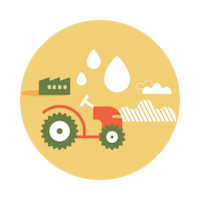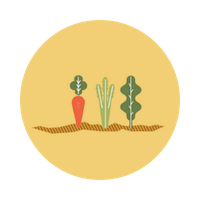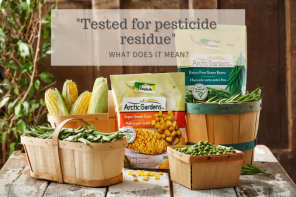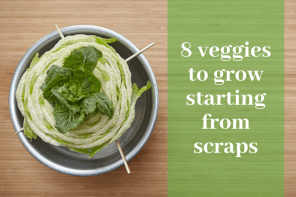A simple act like buying a plastic bottle of water may seem trivial and seem to have only a very small influence on the environment, but it’s when millions of people do the same thing that it takes on huge proportions. Fortunately, this concept also works the other way around: by simple actions, you can significantly reduce your share and change the future of the planet.
What’s Earth Day?
Celebrated on April 22 since 1970, Earth Day is an annual global event for the protection of the environment. It’s the most important environmental celebration and its main mission is to support people and organizations in reducing their impact on the environment.
In Quebec, Earth Day has been celebrated since 1995, in particular by organizing all kinds of awareness-raising activities on environmental issues.
How do you reduce your environmental food footprint?
When we talk about environmental footprint, we mean people’s impact on the environment. It’s an estimate of the land area needed for a person to be able to support themselves. Today, there are tools available to calculate the trace we ourselves leave on the planet.
Go calculate your environmental footprint, then come back and see the solutions available for you to reduce your environmental impact on food.
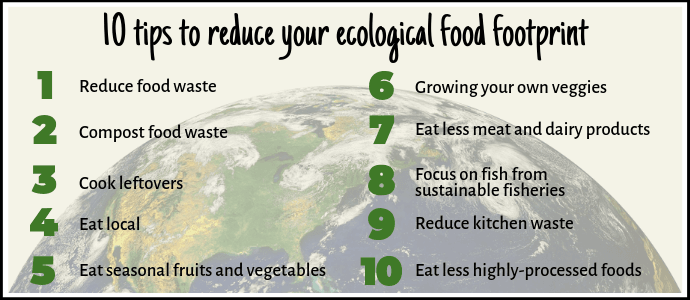
1. Reduce food waste
In many cases, consumers tend to buy more food than they really need and some of it inevitably ends up in the garbage. According to the Food and Agriculture Organization of the United Nations, “food waste accounts for about 8% of total human-induced greenhouse gas emissions, which is almost as much as road transport”.
To help you, you can plan your weekly menu by listing the ingredients you need for each meal and buying only what you need. In addition to being beneficial to the environment, reducing food waste will also save you money.
Read our article, “A sensible kitchen to control waste” to learn all the tricks.
2. Compost food waste
The principle of composting is to return organic matter to the soil. While compostable waste would represent one-third of the household garbage, you can contribute in a simple and natural way to reducing landfill congestion by composting your food waste.
In addition, compost is an excellent source of fertilizer and can be used in your garden to help your plants and vegetables grow! It also helps you avoid using chemicals and thus contributes to soil and water preservation.
Not sure which foods are allowed or not in the compost bin? This quick guide will help you to sort your organic waste. For example, all leftover fruit and vegetables should be composted, while all animal residue such as dairy products, meat and fish should be avoided.
3. Cook leftovers
Do you find that vegetables are often sold in packages containing more servings than you need for a recipe? Before putting them in the compost, why not give them a second chance to be cooked? Most vegetables go really well in soups or soups. Try to find a second use for your leftovers and help the environment and your wallet at the same time.
It’s also possible to remake a recipe that you’ve already eaten the day before. See how in our article, “The art of cooking leftovers like a chef!”
4. Eat local
Buying locally reduces the number of kilometres travelled between the product and your table, thereby reducing the negative impact of transport. As well as supporting the local economy, you significantly reduce your environmental footprint!
How to define eating local? The definition of “local” may vary from person to person, but to help you out, remember that the farther the product, the more impact it has on the environment. That’s why it’s advisable to consume food that is produced less than 640 km from home.
A good way to buy local is to eat fruits and veggies that are in season. You can sign up for vegetable baskets from farms near you or buy them directly at the local market.
5. Eat seasonal fruits and vegetables
As mentioned above, the farther the product, the more its impact on the environment is significant. That means if you buy strawberries in winter, for example, there’s a strong chance that they didn’t come from Quebec. As well, strawberries that come from far away have been picked before ripe, so they’re still good when they land at your table. This means that after a long journey, these strawberries are neither fresh nor ripe.
Eating seasonal fruits and vegetables, therefore, makes it possible to have foods that are exceptionally fresh since they’re picked when ripe, as well as reduce the environmental impact of transportation. Check the fruit and vegetable availability calendar to find out which food to eat for each season. Some fruits and veggies can be consumed all-year long, like garlic, beets, carrots, mushrooms, cabbage and apples.
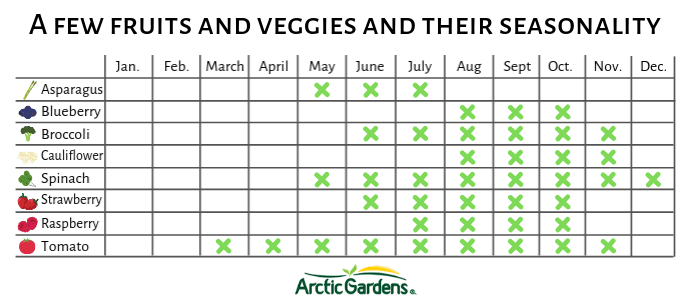
But it’s not impossible to eat vegetables out of season. Frozen vegetables are harvested in season, so you can eat them all-year round without worrying about the kilometres travelled.
6. Growing your own veggies
Want to know what’s even better to the environment that buying local? Growing your own veggies! So, in addition to knowing where exactly your food comes from since you’ve grown it in your garden, the ecological footprint will be zero. You can even use the compost generated by your food waste as fertilizer for your vegetables.
Making a garden requires a little more work, but you won’t find fresher food! You can even freeze them to enjoy them for longer.
Here are two articles that can help you start your own veggie garden: Gardening 101 and City gardening made simple.
7. Eat less meat and dairy products
According to Greenpeace, livestock farming accounts for 14.5% of greenhouse gases, the same as the transport sector. As well, 75% of farmland is used to raise livestock. That means three-quarters of the world’s agricultural land is used to grow grain to feed livestock, which in turn will be used to feed the population.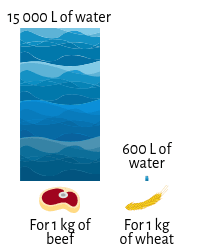
Industrial livestock farming also requires huge quantities of water. In fact, meat production requires larger quantities of water than grains and legumes. For example, the production of one kilogram of beef requires an average of 15,000 litres of water.
A vegetarian or vegan diet would, therefore, be much more beneficial from an environmental point of view, but simply reducing your consumption of meat and dairy products would have a positive impact on your environmental footprint. Here are a few tricks on rethinking food with less meat. Among other things, you can add legumes and tofu to your diet instead of eating meat and replace cow’s milk with plant milk.
8. Focus on fish from sustainable fisheries
According to the Food and Agriculture Organization of the United Nations, “58% of the world’s fish stocks are fully exploited and 31% are overexploited”. Salmon and tuna are among the fish that has overexploited stocks. Overfishing doesn’t allow species to reproduce adequately and this could lead to the extinction of some species.
Sustainable fishing is a fishery that ensures that fish have time to reproduce and doesn’t harm their environment or other species. To see if the fish you buy is from sustainable fishing, look for logos that certify it, such as the Marine Stewardship Council (MSC) logo. In any case, fish that are overfished, such as salmon and tuna, should be avoided. You can replace them with lesser known, but equally good fish, such as Pacific cod or rainbow trout. The Aquarium de Québec has a guide to help you choose your fish better.
9. Reduce kitchen waste
Plastic is a big problem in today’s society. Everything is always overpackaged. Even if some plastics are recyclable, most packaging ends up in the garbage. As landfills overflow, it’s inevitable to change your consumption habits and move towards a zero waste lifestyle. At least, you have to try as much as possible!
To reduce waste in the kitchen, you can, among other things:
- buy products in bulk
- use reusable bags
- avoid coffee capsules
- choose environmentally-friendly alternatives to Ziplock bags
- recycle everything you can, etc.
If you want to adopt a zero waste lifestyle, you might find this article interesting: Zero waste lifestyle: A beginner’s guide.
10. Eat less highly-processed foods
Highly-processed foods require many ingredients, especially for product shelf-life, which are often of little benefit to the environment, including palm oil and many chemicals. Therefore, the production of ultra-processed food often leads to the contamination of rivers and deforestation, which in turn contribute to the destruction of habitats of many animal species.
Among the most processed foods are:
- sugary drinks
- fruit juice
- bread
- ready-to-eat meals
- flavoured yoghurt
To reduce your ecological food footprint (and for your health), you must avoid consuming highly-processed food as much as you can. The best way to do that is to cook as often as possible!
Bonduelle for the environment
At Bonduelle, Arctic Gardens’ parent company, we also want to do our part for the environment. We believe in our slogan “Nature, our future” and we do our best to contribute to a healthy planet.
Each of our North American plants has an action plan, reviewed annually, that evaluates good energy and water practices. As a result, at the end of each year, we can evaluate each plant’s progress with the goal of achieving a score of 100% in energy and drinking water savings.
For 2017-2018, the waste recovery rate was 86% and we’re hope to reach 95% by 2025.
In our fields, there is no place for GMOs and most of our vegetables grow in the country where they’re sold. As well, we’re working hard to grow products without pesticide residue and developing a range of organic products. We’re also trying to significantly reduce insecticides in our fields by using insect traps, for example.
Our objectives by 2025:
- more environmentally-farmed land: we will have developed our sustainable agricultural practices to minimize the use of plant treatment products and mineral fertilizers
- even more renewable energy: plants better equipped to produce renewable energy, zero waste plans for natural resources from field to table, water recycled directly on site
- sustainable and healthy food: vegetables are a food of the future for the planet. We will have continued to enhance their value through their traceability, recipes, organic products, environmentally-friendly packaging, our short circuits, etc.
- obtain B Corp certification: B Corp certification is granted to companies that meet societal and environmental requirements, governance requirements and public transparency
“The transition is underway!
And it’s already well-advanced here at home.”
Even though Earth Day is celebrated only once a year, it takes a lot of effort all-year round to help our beautiful planet stay healthy. So what are you going to do to reduce your environmental footprint?



